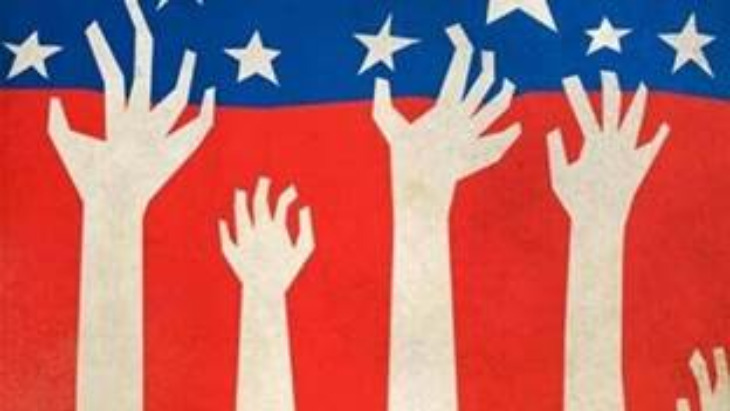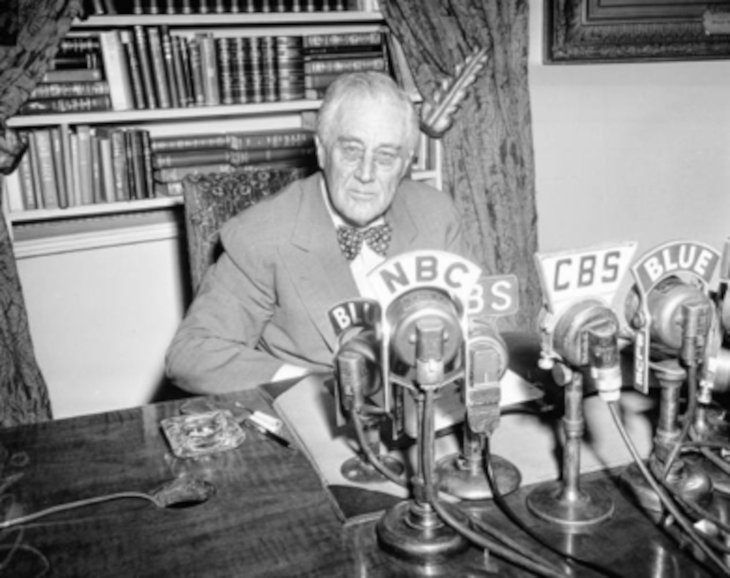 Identifying as a Jew
Identifying as a Jew


7 min read
In a powerful film, Ken Burns chronicles America's abandonment of the Jews during the Holocaust.
On Jan. 30, 1933, Adolf Hitler was sworn in as the chancellor of Germany. Over the next 100 days, American newspapers published more than 3,000 thousand stories about the eruption of antisemitic attacks whipped up by the new regime.
"Bands of Nazis throughout Germany carried out wholesale raids calculated to intimidate the opposition, particularly the Jews," reported Edmond Taylor of the Chicago Tribune. "Men and women were insulted, slapped, punched in the face, hit over the head with blackjacks, dragged from their homes in night clothes. Never have I seen law-abiding citizens living in such terror."
Taylor's story is quoted early in "The US and the Holocaust," a six-hour documentary by Ken Burns that airs this week. It is cited to make the point that for Americans who cared to know what was happening to the Jews under the new German government, the information was readily available. News accounts like Taylor's fueled widespread protests. On March 27, more than 20,000 New Yorkers packed Madison Square Garden, with 35,000 more outside, to condemn the Nazis' behavior. Similar rallies were held in scores of cities across the country.
Efforts to downplay the truth also came from the US government.
Pressure to suppress both the news coverage and the protests was not long in coming. Some of that pressure came from Germany, where Nazi officials denied that they were targeting Jews and claimed that the negative stories were "Jewish lies." But efforts to downplay the truth, the new documentary makes clear, also came from the US government.
"The American embassy in Berlin cabled Secretary of State Cordell Hull that it was the Nazis who were lying and that the Jewish situation was rapidly taking a turn for the worse," the film's narrator says. "But Hull insisted that the mistreatment was coming to an end and that things would revert to normal — if the protests in America would stop."
There are a number of interlocking themes in "The US and the Holocaust." Among them: the entrenched antisemitism of prewar America, the stiff anti-immigration laws that excluded most refugees from the United States, and the way Jim Crow segregation in the American South provided a model for the Nazis' infamous Nuremberg laws stripping German Jews of their rights. In his trademark fashion, Burns interweaves gripping human stories, some recounted by survivors who managed to avoid the fate that befell 6 million of Europe's Jews, others told about those who struggled in vain for permission to enter America but ended up as corpses in the Nazi ghettoes, execution pits, and death camps.
Through it all, the US government, with some rare and heroic exceptions, not only refused to help Europe's Jews escape the Nazi genocide, it went to extremes to suppress or downplay reports of the horror that was underway. Hull's grotesque contention in the spring of 1933 that putting a lid on anti-Nazi criticism in America was the best way to ease anti-Jewish attacks in Germany was no aberration. Again and again, the administration of Franklin D. Roosevelt, and especially the State Department, where FDR's close friend and financial backer Breckinridge Long was a powerful assistant secretary of state, worked assiduously to thwart refugees from reaching safe haven in the United States.
As German Jews desperately lined up for permission to immigrate to the United States, the State Department maintained that very few actually wanted to come to America. It kept raising the bar to keep them out. "Consular officials in Berlin and everywhere else in Europe continued zealously to enforce the old directive to deny a visa to any would-be immigrant likely to become a public charge and therefore required extensive data on each applicant's financial resources," the documentary explains. "They also continued to insist on duplicate copies of birth certificates and government documents attesting to an applicant's good character." The US government, in other words, required Jews to get a character reference from the Nazis they were trying to escape.
The worse persecution grew in Europe, the more callous US officials seemed to become.
The worse persecution grew in Europe, the more callous US officials seemed to become. The American consul in Stuttgart for example, was notorious for turning down applicants who had a single flaw in their paperwork. As "The US and the Holocaust" chronicles, the State Department in that era was a hotbed of antisemitism and nativism; for Long and many of the personnel he oversaw, the ultimate fate of Jews under Nazi rule was a matter of indifference so long as they could be kept from entering America.
Burns has called this documentary "the most important work" of his career. It is a gripping narrative, rich in history and human interest. Even viewers who know a great deal about the Holocaust era will be taken aback by some of its revelations.
 When legislation was offered in Congress to admit 20,000 Jewish child refugees, President Roosevelt refused to speak in its favor. He likewise refused any help for the 937 refugees aboard the St. Louis, who reached the coast of Florida in 1939, only to be denied entry and forced to return to Europe.
When legislation was offered in Congress to admit 20,000 Jewish child refugees, President Roosevelt refused to speak in its favor. He likewise refused any help for the 937 refugees aboard the St. Louis, who reached the coast of Florida in 1939, only to be denied entry and forced to return to Europe.
I had not realized, for instance, that Anne Frank and her family, having fled from Germany to Holland, subsequently applied for sanctuary in the United States. Nor had I known how abjectly Hollywood kowtowed before the Nazis: For the first seven years of Hitler's regime, no character in any US film breathed a word of criticism about the Third Reich. So intent were US studios on not jeopardizing their access to the German market that Hitler's vice consul in Los Angeles was allowed to approve or disapprove scripts before production began. And while I was only too aware of FDR's profound unwillingness to take any action that might have stopped the Nazi juggernaut, I never knew that he himself recycled the antisemitic canard that admitting Jewish refugees threatened national security, since the Jews might be Nazi spies.
The one serious weakness in Burns's documentary is how hard it tries to justify FDR's inaction. Repeatedly viewers are told that the president could not get out in front of public opinion, which was unwilling to open the doors to refugees. But Roosevelt, despite his vast popular following, made no effort to influence that public opinion.
Thus, amid the outrage that followed Kristallnacht, when Jewish businesses and synagogues across Germany were destroyed and 30,000 Jews dragged off to concentration camps, FDR would do no more than recall his ambassador from Berlin as a sign of disapproval. He steadfastly declined to criticize any Nazi official by name. And when legislation was offered in Congress to admit 20,000 Jewish child refugees, Roosevelt refused to speak in its favor. Just as he refused any help for the 937 refugees aboard the St. Louis who reached the coast of Florida in 1939, only to be denied entry and forced to return to Europe. Just as he refused to allow the railroad tracks leading to Auschwitz to be bombed, even as US bombs were being dropped on industrial and oil facilities nearby.
During the 12 years of Hitler's rule, 2 of every 3 Jews in Europe were murdered. Of all the Allies, the United States was best positioned to save Jewish lives. But even in the strongest, richest, and safest country on earth, saving those lives was not a priority.
"We let our consciences realize too late the need of standing up against something that we knew was wrong," Eleanor Roosevelt would say after the war was over. "We therefore had to avenge it — but we did nothing to prevent it."
This article originally appeared in The Boston Globe.

This is surely one of the most important, if not THE MOST IMPORTANT, article Aish has published to date. Yasher koach . Thank you so much for educating us.